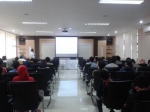PRIMA 2023: ITB Partners with Ministry of Villages to Elevate Indonesia's Underdeveloped Villages by 2030
By Anggun Nindita
Editor Anggun Nindita

BANDUNG - Institut Teknologi Bandung's (ITB) Office of the Vice Rector for Research and Innovation (WRRI ITB) hosted the Research, Innovation, and Community Service Exhibition (PRIMA) on Wednesday (20/12/2023). The event, which took place both offline at ITB's West Hall and East Hall and online via ITB's YouTube Channel, featured discussions covering research, community service, innovation, and research/startup centers. The community service segment was moderated by Denny Willy Junaidy, S.Sn., M.T., Ph.D., Secretary of the Community Service Division at LPPM ITB.
The community service discussion featured four main speakers: Dr. Dimposma Sihombing, S.Sos, M.AP, Director of Socio-Cultural and Institutional Development; La Ode Muhajirin, S.IP, M.Si, Head of the Center for Integrated Preparation of Village Development Plans, Disadvantaged Villages, and Transmigration; Arif Susanto, S.T., M.T., Faculty of Earth Science and Technology ITB; and Dr. Ir. R. Budi Sulistijo, M.App.Sc., Faculty of Mining and Petroleum Engineering ITB.
ITB has long been committed to innovating and benefiting the community through community service. This commitment led to a collaboration between ITB and the Ministry of Villages, Development of Disadvantaged Regions, and Transmigration (PDTT) on February 10, 2023. This collaboration signifies ITB's involvement in government programs aimed at improving Disadvantaged Villages, particularly in 3T areas.
According to Dimposma Sihombing, the 2020-2024 National Medium-Term Development Plan (RPJMN) targets the completion of 25 out of 62 disadvantaged districts, primarily in Southeast Nusa Tenggara, Maluku, Sulawesi, and Papua. Over approximately 10 months, ITB and PDTT successfully completed eight districts and 30 disadvantaged villages in North Maluku and East Nusa Tenggara (NTT).
La Ode highlighted that out of approximately 75,265 villages in Indonesia, a significant number remain underdeveloped. He aims to complete 62 underdeveloped villages by 2030, recognizing that 91% of Indonesia's territory comprises villages, and 43% of the population resides in these areas.
The collaboration, guided by PP No. 78/2014, focuses on elaborating programs in disadvantaged areas related to Socio-Culture, Facilities and Infrastructure, Natural Resources, and Special Regional Development. It aims to accelerate the development of very underdeveloped and underdeveloped villages.
To effectively address challenges, careful planning is essential. The village's Sustainable Development Goals (SDGs), comprising 18 goals, serve as a blueprint for design development. Additionally, the collaboration emphasizes integrating and synergizing programs to achieve SDGs using appropriate technology in 3T locations.
This collaboration requires funding, and LPPM ITB incorporates Environmental, Social, Government (ESG) considerations into its operations to ensure sustainable clean water supply. Budi Sulistijo emphasized the need for collaboration among universities, the Ministry of Villages, companies/sponsors, and citizens to realize sustainable programs.
Arif Susanto highlighted several community service programs related to clean water supply, focusing on villages such as Gurimonearu, Wadumaddi, Manleten, Pangalengan, and Geyongan. These activities align with Village SDG number 6 and involve geological, hydrogeological, and execution surveys.
ITB is dedicated to supporting these initiatives to achieve the goal of completing Disadvantaged Areas by 2030.
By collaborating with the Ministry of Villages and leveraging innovative solutions, ITB aims to uplift Indonesia's underdeveloped villages, paving the way for sustainable development and improved quality of life for its residents.
Reporter: Pravito Septadenova Dwi Ananta (Geological Engineering 2019)
Translator: Anggi Nurdiani (Management, 2021)
Editor: Vera Citra Utami

.jpg)
.png)
.jpg)
.jpg)
.jpg)


